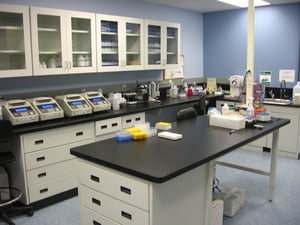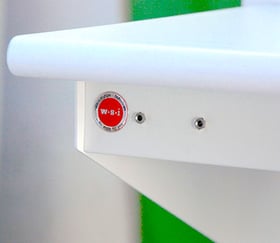If you’re in the process of designing an industrial metal workbench for your workspace, chances are you need it to be able to withstand the harsh conditions of a laboratory or manufacturing facility.
The countertop you choose for your industrial work bench plays an important role in how successful your design is for your real world application.
After all, countertops are often some of the most used pieces of furniture in your workspace since your equipment and any chemicals and substances that you use come in contact with them on a regular basis.
So which countertop is best for your workbench? It depends.
Because industrial workbenches are found in a variety of environments, from educational and research labs to testing and manufacturing facilities, the countertop you choose is dependent on your application, cleanliness requirements and budget.
Below are six options that perform well in lab and manufacturing environments that each have their own unique benefits and may be the perfect fit for your space:
- Phenolic Resin
- Epoxy Resin
- Chemical Resistant Laminate
- High Pressure Laminate
- ESD Laminate
- Stainless Steel
Phenolic Resin
 Phenolic resin countertops are highly sought after today because of their resistance to several conditions found in severe environments.
Phenolic resin countertops are highly sought after today because of their resistance to several conditions found in severe environments.
This type of countertop is manufactured by layering natural kraft paper that has been saturated with phenolic resin and processed under high heat. The result is one solid, lightweight countertop.
Why You May Need Phenolic Resin
If your facility requires a higher level of cleanliness or has an above number of extreme conditions, phenolic resin may be a wise investment. Phenolic resin countertops are moderate duty and offer high resistance to:
- Bacteria
- Chemicals
- Fungus
- Moisture
- Scratches
This type of material also offers moderate to high resistance to corrosion and continuous heat exposure up to 350 degrees F. Phenolic resin also holds up well to impact and stress fractures and is lightweight for easier installation.
Today, especially, as more labs take on scientific testing in the wake of COVID-19, phenolic resin is an excellent choice because of its ability to hold up against harsh chemicals like acids, bases, salts, halogens, solvents and most conventional cleaning agents.
Why Phenolic Resin May Not Be Best For Your Facility
If you have a tight budget, the cost of phenolic resin may not meet your requirements. When compared to other materials, phenolic resin is mid-price at around $15 to $18 per square foot, with increases based on modifications specific to a lab’s need.
Phenolic resin is also not flame retardant, so if you have open flames in your lab, this could present a concern.
Epoxy Resin
Epoxy resin countertops are made from a mixture of materials that are then cured as a solid continuous product. These materials primarily include epoxy resin and silica, but also typically include a hardener and a filler.
This combination of materials are then molded and oven cured. The heat permanently sets the material into a solid slab.
Why You May Need Epoxy Resin
Epoxy Resin offers the same benefits as Phenolic Resin, though a few key additional advantages. This heavy duty material offers high resistance to:
- Bacteria
- Fungus
- Corrosion
- Chemicals
- Water and moisture
- Scratches
Epoxy resin also can withstand continuous heat exposure above 350 degrees F and is flame retardant. These are important key features that set epoxy resin apart from phenolic resin and other materials. It also holds up well to impact and stress fractures.
Although a more cosmetic benefit, those who want to customize the look of their work surfaces can easily do so with epoxy resin. Properties of the mixture can be modified to provide specific characteristics, including color.
Keep in mind, though, that there is a big difference between laboratory grade epoxy resin and DIY epoxy resin. Make sure any epoxy resin countertops that you purchase have been tested for best practices and to ensure they can withstand harsh conditions.
Why Epoxy Resin May Not Be Best For Your Facility
The biggest feature that works against epoxy resin is its price tag. Epoxy resin can run as much as $100 to $200 per square foot.
If your lab or manufacturing company has a limited budget for countertops, and does not require the flame retardant feature that epoxy resin provides, you may want to consider phenolic resin or another material instead.
Chemical Resistant Laminate
 Chemical Resistant Laminate countertops are created by layering melamine resin with layers of wood fibers and phenolic resin-impregnated kraft paper. A decorative substrate gives the countertop its pattern, creating countertops that are readily available in a variety of patterns, colors and designs.
Chemical Resistant Laminate countertops are created by layering melamine resin with layers of wood fibers and phenolic resin-impregnated kraft paper. A decorative substrate gives the countertop its pattern, creating countertops that are readily available in a variety of patterns, colors and designs.
While laminate is a term often associated with home and office furniture, Chemical Resistant Laminate is designed to withstand harsh conditions and exposure to chemicals better.
Why You May Need Chemical Resistant Laminate
As the name implies, Chemical Resistant Laminate offers a high level of chemical resistance. It also offers protection from heat exposure up to 275 degrees F and designer looks.
Compared to other materials, Chemical Laminate countertops are mid-price.
Why Chemical Resistant Laminate May Not Be Best For Your Facility
This light duty material offers more protection than laminate countertops found in an office setting, but it still offers low resistance to:
- Bacteria
- Corrosion
- Fungus
- Water and moisture
- Scratches
Chemical Resistant Laminate can also chip at the seams and get surface cuts.
High Pressure Laminate
High Pressure Laminate (HPL) is constructed by applying a melamine resin over decorative surface paper. It is then bonded to a core of kraft papers impregnated with phenolic resin. The result is a decorative work surface that is both functional and durable.
Why You May Need High Pressure Laminate
High Pressure Laminate is one of the more affordable industrial countertops, running at around $25 to $40 per square foot. This type of material can also withstand heat exposure up to 275 degrees F and offers designer looks that can provide a nice aesthetic to a workspace.
Why High Pressure Laminate May Not Be Best For Your Facility
Despite its benefits, High Pressure Laminate is not recommended for exposure to extremes in humidity or heat over 275 degrees F for long periods of time. It is also considered to be light duty and offers low resistance to:
- Bacteria
- Chemicals
- Corrosion
- Fungus
- Water and moisture
- Scratches
While High Pressure Laminate is great for dry environments that perform general functions and in environments like product testing labs, it should not be used where abrasive chemicals are routinely used.
ESD Laminate
 ESD Laminate is one of the best surface materials for a workspace that has a sensitivity to static. Static electricity can pose a major problem, especially in laboratories and industrial settings. This reaction is caused by friction and can impact production, accuracy and worker safety.
ESD Laminate is one of the best surface materials for a workspace that has a sensitivity to static. Static electricity can pose a major problem, especially in laboratories and industrial settings. This reaction is caused by friction and can impact production, accuracy and worker safety.
ESD Laminate surfaces are made of high pressure laminate with a carbon layer that dissipates any static that is generated.
Why You May Need ESD Laminate
If your environment has specific Electrostatic Discharge (ESD) requirements, ESD Laminate can offer protection. This type of material is durable and requires the same level of care as most other materials to maintain the integrity of the surface.
ESD Laminate also provides additional benefits, such as resistance to staining and chemicals that include acetone, gasoline and 10% ammonium solutions.
Why ESD Laminate May Not Be Best For Your Facility
While the cost of ESD Laminate work surfaces vary by quality and manufacturer, this type of work surface in general can be more expensive than its counterparts. ESD Laminate is about 15 to 30% higher than a non-ESD product. If static electricity is not a concern in your workspace, it may not be cost effective to purchase this type of material.
Employees will need to regularly check ESD surfaces for damage wear and tear using a megohmmeter, which can ensure the surface meets required standards for safety.
Stainless Steel
Stainless steel countertops are made of low carbon steel that is made up of chromium and nickel. Chromium makes it resistant to rust and corrosion, while nickel ensures stain and heat resistance.
Why You May Need Stainless Steel
Stainless steel is also a non-porous surface, which means no liquids or substances can penetrate into the material at all. Bacteria, mold and other common household germs don’t have a chance of becoming a problem with stainless steel as well. Other advantages of this moderate to heavy duty material include:
- Moderate chemical resistance
- Moderate corrosion resistance
- High fungus resistance
- High water and moisture resistance
- Continuous heat exposure above 1500 degrees F
Why Stainless Steel May Not Be Best For Your Facility
Although stainless steel can withstand continuous heat exposure above 1500 degrees F, it may discolor at prolonged high temperatures. It also offers low resistance to scratches and can dent easily on impact.
It also carries a high price tag, with Epoxy Resin being the only material on this list with a higher cost.
The Best Choice For Your Workspace
When choosing a material for your countertop, keep in mind cleanliness requirements, budget and your application…now and in the future. Countertops can be costly to replace, so it’s important to weigh your current needs and any future needs you may have.
You can read more about the types of environments each of these materials are typically found in in our articles, Top 5 Materials To Consider For Your Lab Countertops and When Should ESD Laminate Surfaces Be Used?


